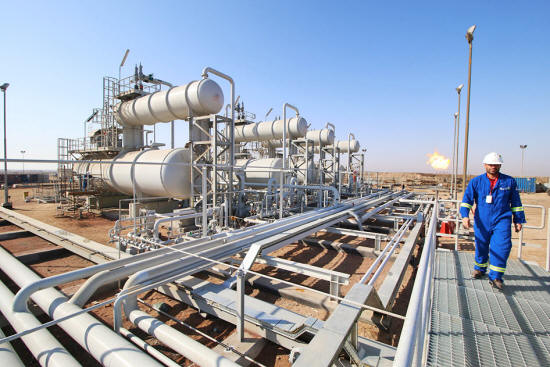|
from AsiaTimes Website
Italian version a yuan-based system for oil futures.
Photo:
Reuters oil-futures trading in the yuan which will be fully convertible into gold on the Shanghai and Hong Kong exchanges...
The era of the
petroyuan will be at hand.
Diplomats confirmed that
to Asia Times.
Beijing already has close economic ties with Moscow, while it is distinctly possible that other producers will join the club.
An extensive report by DBS in Singapore also hits most of the right notes, linking the internationalization of the Yuan with the expansion of the grandiose Belt and Road Initiative.
Next year, six major BRI projects will be on the table.
Mega infrastructure developments will include, The other key projects will be,
HSBC has estimated that the expansive One Belt One Road program will generate no less than an additional, game-changing US$2.5 trillion worth of new trade a year.
It is important to remember that the "belt" in BRI is a series of corridors connecting Eastern China with oil-gas rich regions in Central Asia and the Middle East.
The high-speed rail networks, or new "Silk Roads", will simply traverse regions filled with, what else, un-mined gold. But a key to the future of the petroyuan will revolve around the House of Saud, and what it will do.
Should the Crown Prince, Mohammad bin Salman bin Abdulaziz Al Saud, also known as MBS, follow Russia's lead? If it did, this would be one of the paradigm shifts of the century.
Yet there are signs of what could happen.
Yuan-denominated gold contracts will be traded not only in Shanghai and Hong Kong but also in Dubai. Saudi Arabia is also considering issuing so-called Panda bonds, with close ally, the United Arab Emirates, taking the lead in the Middle East for Chinese interbank bonds.
Of course, the prelude to D-Day will be when the House of Saud officially announces it accepts the Yuan for at least part of its exports to China. But what is clear is that Saudi Arabia simply cannot afford to alienate Beijing as one of its top customers.
In the end, it will be China which will dictate future terms. That may include extra pressure for Beijing's participation in Aramco's IPO. In parallel, Washington would see Riyadh embracing the petroyuan as the ultimate red line.
An independent European report pointed to what might be Beijing's trump card,
Nations hit hard by US sanctions, such as,
...will be among the first to embrace the petroyuan.
Smaller producers, such as Angola and Nigeria, are already selling oil and gas to the world's second largest economy in Chinese currency.
As for nations involved in the new "Silk Roads" program that are not oil exporters such as Pakistan, the least they can do is replace the dollar in bilateral trade. This is what Pakistan's Interior Minister Ahsan Iqbal is currently mulling over.
Of course, there will be a "push back" from the US. The dollar is still the global currency, even though it might have lost some of luster in the past decade.
But the BRICS, as well as the Shanghai Cooperation Organization, or SCO, which includes prospective members Iran and Turkey, are increasingly settling bilateral and multilateral trade by bypassing the green back.
In the end, it will not be over until the fat (golden) lady sings.
When the beginning of the end of the petrodollar system becomes a fact, watch out for a US counterpunch...
|


